I've been to Italy during a previous trip to Europe, but didn't have time to visit Rome because of a constrained schedule. This time around, I made sure I included the Italian capital in my itinerary.
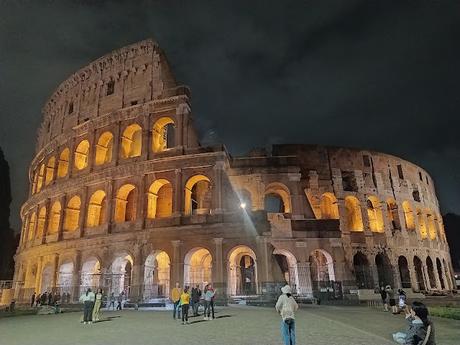
I spent a few days in Rome, check out my post to learn more about my trip.
Travel Guide Budget and Itinerary for Rome
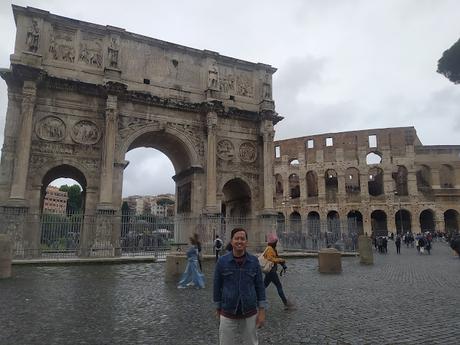
Rome also known as the Eternal City, is the capital of Italy and the seat of the Catholic Church. The ancient Roman Empire defined Western civilization during its heyday. It left indelible marks on art and culture throughout its history. Fast forward to today, Rome is one of the most visited cities not just in Europe, but in the world. There's plenty of attractions and good food and wine in the city. You'll easily spend a handful of days during your visit.
Getting a Visa
Italy is part of the Schengen group of countries, which means that you can enter the country regardless of where you got your Schengen visa. The visa application process is straightforward. You'll need to submit the required documents. The embassy where you filed your application decides whether to give you a visa or not.
How to Get to Rome
Rome is one of the most popular destinations in Europe. It's easy to get in and out of the city. Rome is a transportation hub and many airlines, buses and trains arrive in the city.
There are many flights to Rome from different parts of the world. If you're traveling from the Philippines (like myself), you'll transit somewhere in the Middle East. If you're already in Europe, many low-cost airlines travel to this Italian city.
How to get out of the airport. If you're departing from Fiumicino Airport (FCO), it's easy to get to the city center. You can take the Leonardo Express train to Roma Termini Station for €14 one-way. You can also take the bus for around €8 one-way.
Many buses from different parts of Italy stop at Rome. You'll have an easy time finding a bus to get into the city or out of it. I always take Flixbus if they have a route between the cities I want to visit. There are regular buses from major cities in Italy such as Milan, Naples, Florence, and others that travel to Rome.
If you're traveling from a different country in Europe, I found a direct bus from Zurich, Switzerland to Rome. It's a long trip though.
You can also travel by train from different cities in Italy to Rome.
Getting around Rome
Exploring the city is convenient because of public transportation. There are buses, trains, and trams that get you from point A to B. The fare is around €1.50. If you're buying a one-way ticket, don't forget to validate it. There were times when I just used my debit or credit card to pay for the fare. You have the option to buy one or multi-day transportation tickets. A 24-hours ticket costs €7, a 48-hours ticket costs €12.50, and a 72-hours ticket costs €18. You can also purchase a weekly pass for €24.
You can also buy a Roma Pass which provides you with free use of public transportation but also discounts, tourist services, and a museum or two. A 48-hours pass costs €32 while a 72-hours pass costs €52.
Things to Do in Rome
You can easily fill your budget and itinerary for Rome with the city's many attractions.
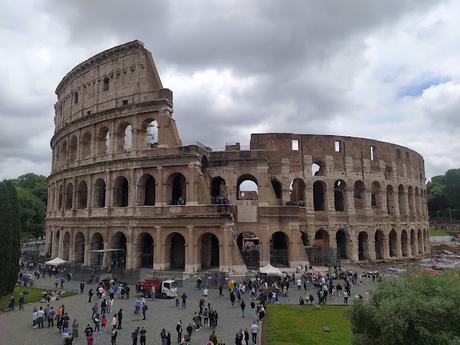
The most iconic attraction in Rome is the Colosseum. You'll see droves of people taking pictures of it or walking into it. Emperor Vespasian initiated this ancient structure's construction in 72 AD. His heir Titus oversaw its completion in 80 AD. The Colosseum is massive despite its age. One can only imagine its grandeur during the ancient Roman empire's heyday. Many events took place here from gladiator battles (of course!), public executions, dramas, and others.
***I bought a combo ticket for €23 which includes the Colosseum, Palatine Hill, and the Roman Forum. Buy here: GetYourGuide
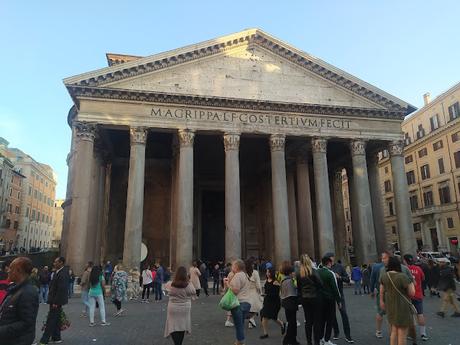
The Pantheon (as the cliche goes) has withstood the test of time. It's one of the most well-preserved monuments the Romans built. Its history spans around 2000 years. It is the burial place of Italian kings and renowned citizens such as Raphael and King Vittorio Emanuele II. The Pantheon is also used as a Catholic church.
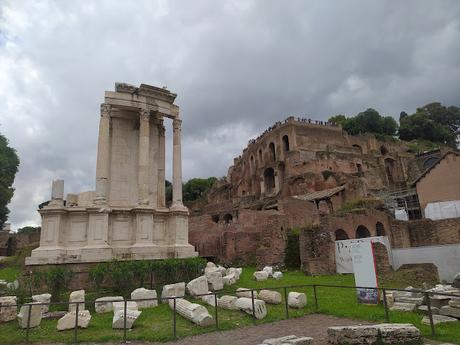
Walking around the Roman Forum felt like entering a time warp. The ruins, fragments of columns, and vestiges of ancient buildings were all over the place. The ruins are only a fraction of what was once a buzzing city.
***I bought a combo ticket for €23 which includes the Colosseum, Palatine Hill, and the Roman Forum. Buy here: GetYourGuide
The Trevi Fountain is one of the most famous and popular attractions in Rome. Many throw a coin into the fountain because doing so assures a return trip to the city. The fountain dates to the 18th century and was designed by architect Nicola Salvi. Construction finished in 1762. Despite being touristy, you should still add this attraction to your budget and itinerary for Rome. Try going early to avoid the crowds
Vittorio Emanuele II MonumentThis huge monument was built to honor Vittorio Emanuele II. He was unified Italy's first king. Construction took place between 1885 to 1935. The idea behind the structure's design was a modern interpretation of a forum. The monument's location at the center of ancient and modern Rome and with streets leading to it give it a symbolic meaning of unity.
Piazza di Spagna and the Spanish Steps are almost often crowded during different parts of the day. However, the area itself is beautiful with a church at the top and the Fontana della Barcaccia. The area's streets are lined with shops such as Dolce & Gabana, Chanel, Louis Vuitton, Versace, and others. When planning your Rome on a budget itinerary, add this free stop.
Excavations on the hill revealed that there have been settlements in the area since 10 BC. As the Roman Empire grew, the rich and powerful started to build their palaces on the hill. Fast forward to today, many tourists go up the hill to get beautiful views of the Roman Forum and its surroundings.
***I bought a combo ticket for €23 which includes the Colosseum, Palatine Hill, and the Roman Forum. Buy here: GetYourGuide
Basilica of St. John Lateran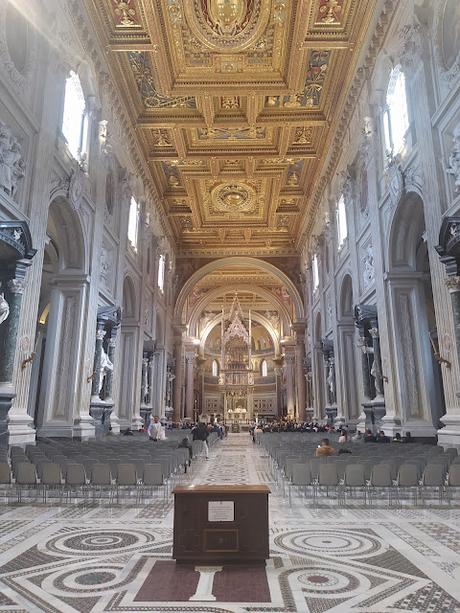
Rome doesn't seem to run out of ancient (but beautiful) churches. This church dates to the time of Constantine. You'll notice the attention grabbing 16th century wooden ceiling once you enter. If you're traveling in Rome on a budget, you can add this to your itinerary (it's free!).
One of the places to add to your budget and itinerary for Rome is the Santa Maria Maggiore. The latter has a long history dating to the 4th century. It is one of Rome's papal basilicas. You'll see some of the oldest mosaics in the city on the church's walls.
Borromini designed this lovely Baroque square. Bernini designed and created the Fontana dei Fiumi. You can also visit the church of Sant'Agnese while you're here. Many locals and tourists hang out here. There are restaurants, shops, and cafes in the area.
Architect Giuseppe Valadier designed the current layout of this piazza in the early 19th century following the neoclassical style. At its center, you'll find the Flaminio an Egyptian obelisk. The latter is one of the oldest and tallest obelisks in the city. You can visit the Chigi Chapel and Cesari Chapel while exploring the piazza. The Cesari Chapel is home to two paintings of Caravaggio.
Church of Saint Ignatius of Loyola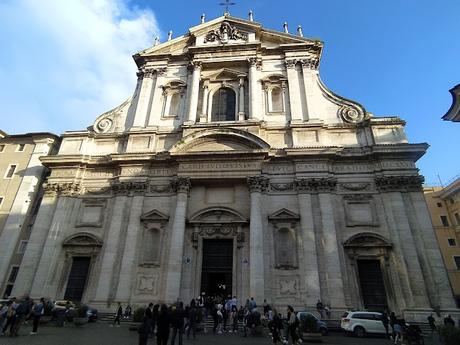
This church was of special interest me because of my alma mater. This church was constructed between 1626-1650 to honor the founder of the Society of Jesus, Ignatius of Loyola. Inside you'll find Andrea Pozzo's beautiful frescoes depicting St. Ignatius and biblical figures.
Some other attractions you might want to add to your budget and itinerary for Rome include:
- Villa Borghese Gallery and Gardens
- Castel Sant'Angelo National Museum
- Capitoline Museum
- Baths of Caracalla
- Palazzo Doria Pamphilj
Exploring the Vatican City
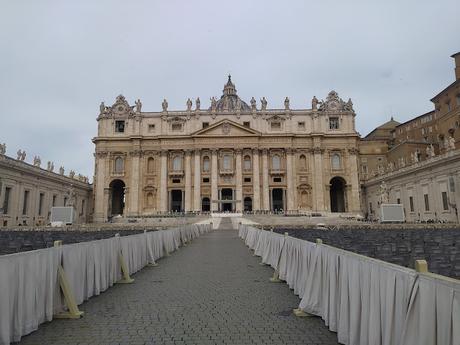
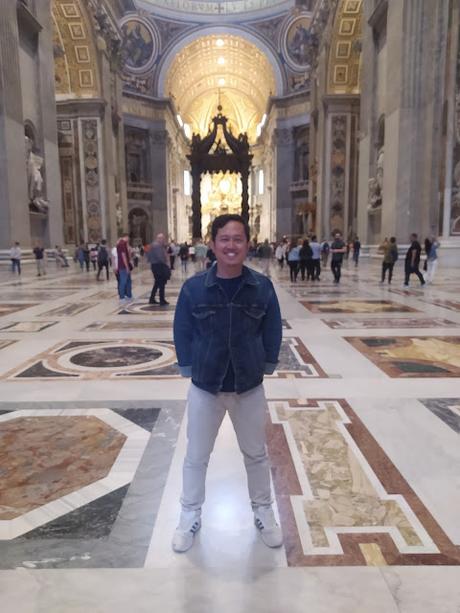
The Vatican City is an independent microstate in Rome. The Vatican is an absolute monarchy with the Pope as its head. It gained its indenpendence with the Lateran Treaty in 1929. The Holy See has a history that dates to centuries before 1929. Fast forward to today, adding the Vatican to a budget and itinerary for Rome is a popular choice.
You could see the highlights of the Vatican in half a day. I went to the Vatican museums first and saw beautiful frescoes and works of art from Raphael, Michelangelo, Botticelli, Perugino, and others. The Raphael Rooms and the Sistine Chapel (of course!) are highlights. You'll see several biblical scenes from both the Old and New Testaments.
St. Peter's Square is a gathering place for visitors, Christians and non-Christians alike. Bernini laid out the square in the mid 1600s. You'll find a towering Egyptian obelisk at the center. This is also where the Christian faithful congregate during Easter Sunday and special occasions.
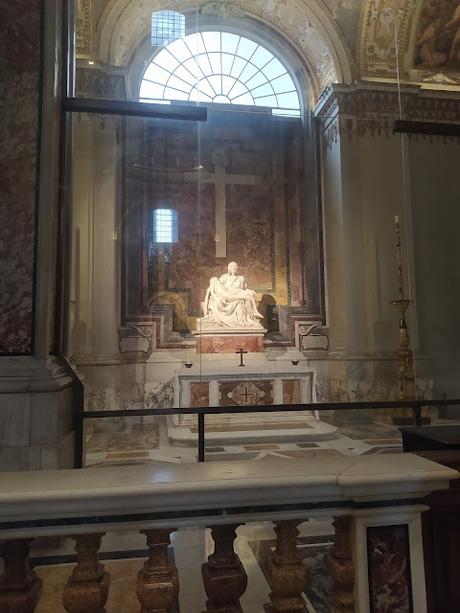
St. Peter's Basilica is the most important church in the city. Construction began and completed sometime between the 16th and 18th centuries. The interiors are (to put it simply) beautiful. Here you'll find works of art such as Michelangelo's Pieta, Bernini's Canopy, John Paul II's grave, Michelangelo's Dome, and Pope Alexander VII's monument just to name a few. You can also visit the Vatican Necropolis where many previous popes are buried.
It's easy to reach the Vatican from Rome's city center. I just took the metro and booked a time slot online. There's always a line to enter St. Peter's Basilica and the Vatican museums. The former has no entrance fee, but you have to queue to get in. I would recommend going early (around 7am) or go late in the afternoon (around 4pm onwards before it closes). As for the museums, I would recommend booking a ticket and a time slot online. You'll pay more but, you can go straight in.
I booked a ticket and time slot for the Vatican museums here: GetYourGuide
Other Destinations in Italy
Italy is one of my favorite countries in Europe. There's plenty of interesting attractions, galleries, and museums. The food = good, the wine = good. It's relatively easy to get from point A to point B but delays can still happen. I went to other cities during my trips to Italy. Rome is centrally located with many trains connecting visitors to other destinations in the country.
The most convenient way to get around is by train. Book train tickets early to get discounted prices. I got business class or premium economy tickets at a lower rate because I bought them early. This practice allows you to fit other places in your budget and itinerary for Rome.
These are other places you might want to add to your itinerary.
Florence is an ancient city that has an unassuming beauty. I enjoyed my visit here, the vibe is so relaxed compared to Rome and Naples. I drank wine, ate delicious food, and saw some of the most beautiful frescoes, paintings, and art work by renowned artists. Some of the most famous attractions in Florence include the Piazzale Michelangelo, Cathedral of Santa Maria del Fiore and Piazza Duomo, Uffizi Palace and Gallery, Pitti Palace, Boboli Gardens, and Ponte Vecchio just to name a few. I would recommend spending at least two nights in Florence. You could also visit Pisa while you're here.
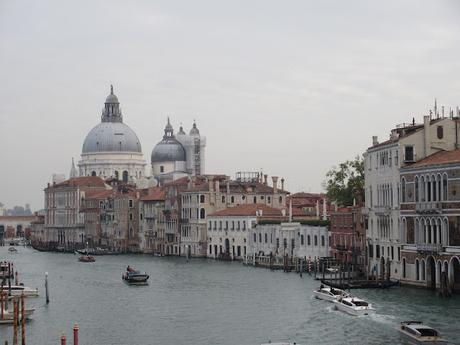
Venice may be touristy, but I'd still recommend a visit at least once in your life. The city itself is picturesque with many canals and narrow walkways that lead you to different districts. Notable spots include St. Mark's Basilica, Piazza San Marco, Doge Palace, Grand Canal, and the Rialto Bridge. You could include Venice in a longer trip around Italy.
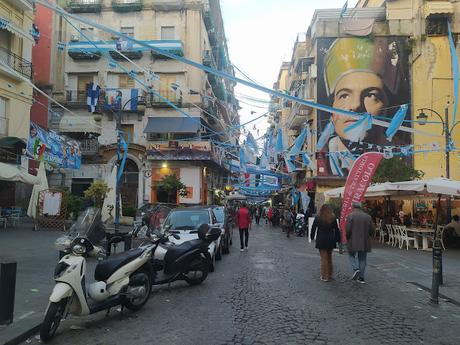
Naples made an impression on me. It was such a vibrant (and choatic) city. There's "life" in every corner with grafitti on the walls, hole-in-the-wall restaurants, almost non-existent traffic rules in the alleys, and the overall long history of the city. Some attractions in the city include Castel Nuovo, Galleria Umberto I, Piazza del Plebiscito, historic center (UNESCO-listed), Naples Cathedral, and others. You could also do a day trip to the Caserta Royal Palace and Pompeii from here. It's possible to do a day trip to Naples from Rome, if you start early enough.
Where to Stay in Rome
My go-to accommodation option is a hostel. The dorms are good value since I'm often outside the whole day anyway. The hostels in Rome are quite pricey for what I got, but are still OK. I book accommodation through www.booking.com.
Budget for Rome
Rome isn't exactly a cheap city but it's possible to explore it on a budget. Here's a list of my expenses you can use for your budget and itinerary for Rome. FYI: Prices might change without prior notice.
112.48 - 4 nights accommodation (I stayed in two different hostels' dorm room)
14 - city tax (3.50 per night)
8 - bus to city from FCO Airport
14 - Leonardo Express to FCO Airport
8.50 - miscellaneous (souvenirs, one-way transportation ticket, etc.)
14 - 2 24 hours transportation ticket
28 - Vatican Museums and Sistine Chapel ticket and time slot
23 - Combo fast track ticket for the Colosseum, Roman Forum, and Palatine Hill
12.90 - train to Caserta from Rome
15 - Caserta Royal Palace ticket
3.70 - train to Naples from Caserta
19.90 - train to Rome from Naples*Total for this 5 days and 4 nights itinerary is 394.88
This is only a Rome on a budget expense list. Prices might change in the future depending on the season you visit, inflation, or other factors. This just gives you a general idea of how much you'd spend. I stayed in dorms, took public transportation, ate at affordable places or supermarket food, walked most of the time, and paid for a few attractions. I was also able to go on a day trip with this budget.
A budget of around €75 per day is enough for a few paid attractions, budget meals or food from supermarkets and bakeries, public transportation, and a bed in a hostel dorm. It's possible to go lower if you just stick to essentials and free attractions. If you have the budget, you could definitely spend luxuriously.
You might also want to check out my other posts about Europe:
Itinerary for Rome
Here's a sample itinerary for your upcoming trip.
Do the greatest hits on your first day
Vittorio Emanuele II Monument
Castel Sant'Angelo National Museum
Basilica of St. John Lateran
Spend day 4 relaxing in the city after a hectic first few days of sightseeing.
You can add more days and places to visit, it all depends on your interests. Rome can serve as your base for day trips, if you don't have much time in Italy.

